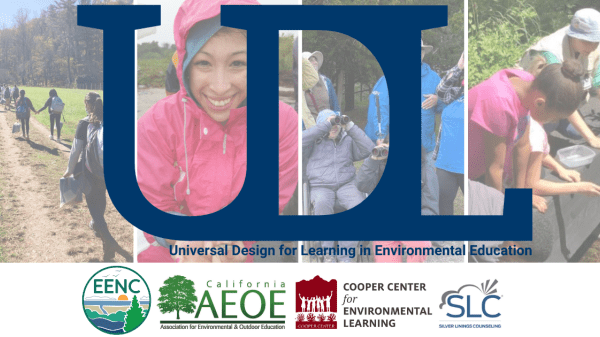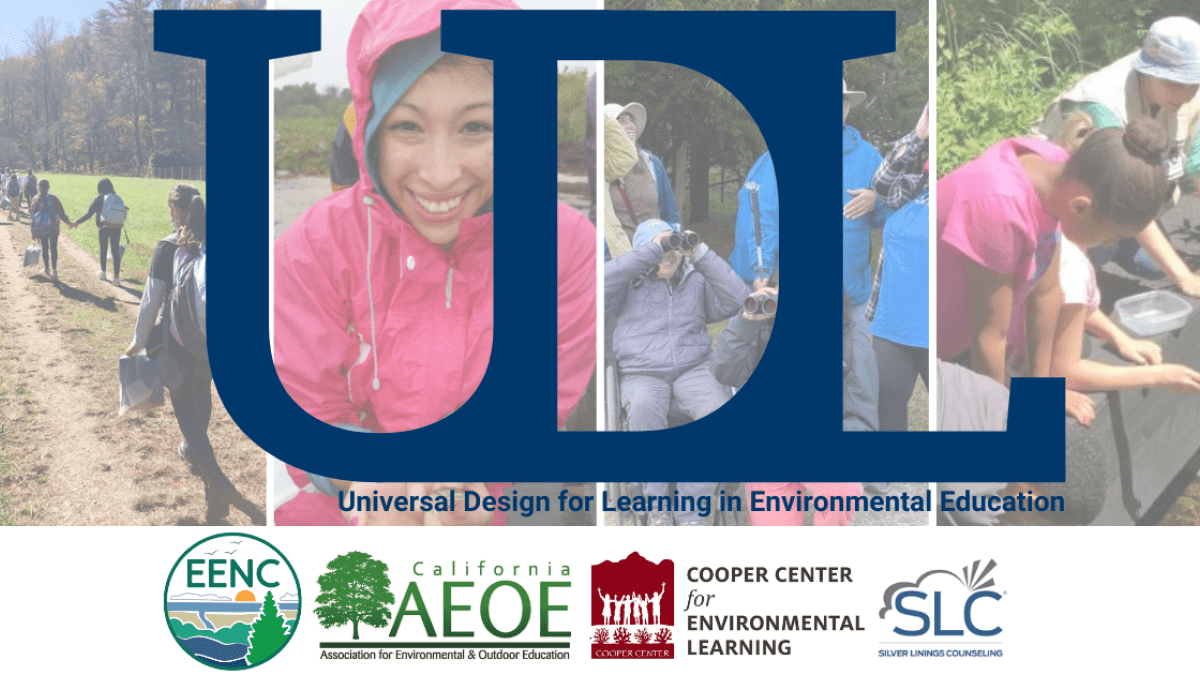The Growth and Impact of Expanded Accessibility Training in Environmental Education

Written by Michelle Pearce, Program Coordinator, Environmental Educators of North Carolina
Whether you are a classroom teacher or outdoor non-formal educator, an experienced professional or just getting started in the field, new to inclusion or have been leading inclusive programming for years, you have probably faced barriers in learner engagement and participation. In an effort to increase the accessibility of environmental education (EE), a Universal Design for Learning in Environmental Education (UDL in EE) course was developed to help environmental educators across the country build their knowledge and expertise to make environmental education more accessible and inclusive to all learners. Universal Design for Learning (UDL) is a type of intentionally inclusive instructional planning based on established principles and evidence-based practices. When applied proactively, it can lead to offerings that are accessible to, usable by, and inclusive of students with a wide variety of needs and abilities. Instead of modifying a program when a student with certain needs arrives, this approach provides all students equal opportunity to succeed from the beginning through intentional efforts to remove barriers and build flexibility.

Promotional banner for the Universal Design for Learning in Environmental Education course. Photo credit: Michelle Pearce
Universal Design for Learning in Environmental Education (UDL in EE) course:
The UDL in EE course was designed by staff from the Environmental Educators of North Carolina (EENC), California Association for Environmental and Outdoor Education (AEOE), and Silver Linings PLLC and launched in 2022 in North Carolina. Since then it has served 125 educators in the state and is now also hosted in California, Pennsylvania, and Arkansas. Plans are in place to offer the course in Minnesota, Wyoming, and Alberta, Canada in 2025.
The UDL in EE course is an online asynchronous course. Participants have 6 weeks to complete the course, and they track their work using a Course Journal. A pacing guide is available and a moderator provides feedback on the journal entries. Registration includes a “pay what you can” option. While it is online, the course includes interactive opportunities with cohort members using learning tools like forums, Padlet, and videos.
The primary focus areas are:
- Understanding the principles of Universal Design for Learning.
- Describing terms, techniques, tools, and resources to promote inclusivity and access to better serve diverse populations, specifically those with learning differences, physical accessibility needs, and language barriers.
- Evaluating current teaching practices/pedagogy and program settings to identify barriers to participation.
- Applying the principles of universal design for learning to the learner’s pedagogical practices to redesign a lesson, activity, or program.
Course registrants have included classroom and non-formal educators, administrators/managers in environmental education centers, university students, and volunteers at environmental education centers. A 2024 Impact Report that analyzed post-course survey data from all four states offering the course, indicates that nearly 100% of participants showed an increase in knowledge of UDL Principles. We have seen remarkably high satisfaction with this course based on evaluation data, as well as participants indicating high levels of confidence in being able to put UDL changes into practice after exploring them in the course.
UDL in North Carolina’s Environmental Educator Certification:
North Carolina is one of the states that offers a certification program to recognize educators with proficiency in both the interdisciplinary content and pedagogy necessary to develop and deliver high-quality, effective EE programs. The certification process varies by state but always includes some professional development activities. The UDL in EE course is currently one of the courses that can be used to meet certification requirements in North Carolina. However, given that the course provides essential skills in equipping educators to provide more accessible programming, EENC plans to submit an application for the course to be approved as a foundational instructional workshop or course. If this is approved, every educator certified through North Carolina’s EE Certification program will be trained in UDL. Currently there are 900 educators enrolled in the program and another 750 who are already certified and actively continuing with their recertification.
Plans for increased access and recognition as an eeCOURSE
As more and more states recognize the value of the UDL in EE course, there is an emerging need for wider availability of this course. With support of the North American Association of Environmental Education (NAAEE), EENC is pursuing approval of the UDL in EE course as a nationally recognized eeCOURSE. NAAEE approved eeCOURSE are high-quality, online professional development courses that are freely available across the Network to be offered by other participating Affiliates. Potential eeCourses are submitted via proposal to a committee of NAAEE Affiliate Members and NAAEE staff, and if approved, they are set on a development timeline that includes collaborative design, opportunities for consultant participation, and pilot testing to gather feedback. That evaluation data is shared with the committee, and a plan is made to move forward to make changes to the eeCourse in order to make it publicly available. Once approved, the UDL in EE course will be easily available to educators across North America.
EENC is looking forward to the continued reach of this course, both in the state of North Carolina and through the NAAEE Affiliate Network.
This eePRO blog series, Ripple Effect, highlights stories of collaboration and impact among partners in the ee360+ Leadership and Training Collaborative. ee360+ is an ambitious multi-year initiative that connects, trains, and promotes innovative leaders dedicated to using the power of education to create a more healthy and sustainable future for everyone, everywhere. Led by NAAEE, ee360+ is made possible through funding and support from U.S. EPA and twenty-five partner organizations representing universities and nonprofits across the country, as well as five federal agencies. Through this partnership, ee360+ brings together more than five decades of expertise to grow and strengthen the environmental education field.

